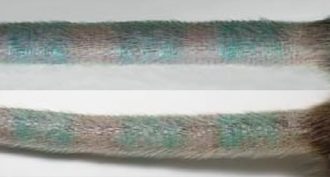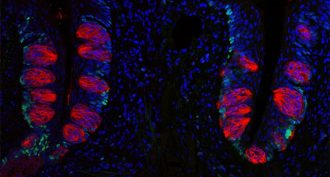Humans
-
 Health & Medicine
Health & MedicineWhich bacteria hang out in belly buttons? Here’s a who’s who
Bacteria are everywhere — even in our belly buttons. One teen at Intel ISEF decided to find out what types people were harboring in their navels.
-
 Life
LifeInked mice hint at how tattoos live on
Tattooed mice challenge our current understanding of how tattoos stay in humans.
By Dan Garisto -
 Health & Medicine
Health & MedicineObesity makes taste buds disappear — in mice, anyway
Mice that gained excessive weight on a high-fat diet also lost one in four taste buds.
-
 Health & Medicine
Health & MedicineScientists Say: Nocturnal and diurnal
Nocturnal animals are active at night. Diurnal animals live it up during the day.
-
 Environment
EnvironmentDirty air can harm your brain and stress the body
New research shows that polluted air can mess with the bodies — including the brains — of even healthy kids and teens.
-
 Psychology
Psychology2016 election stressed out some teens and young adults
Some teens and young adults felt stress, anxiety and fear during the 2016 election — no matter what political candidates they tended to prefer.
-
 Health & Medicine
Health & MedicineScientists offer new explanation for knuckle-cracking
That annoying pop may come from the partial collapse of bubbles in the joint fluid.
-
 Computing
ComputingComputers mine online reviews for signs of food poisoning
Health officials are getting help in identifying restaurant goers who got food poisoning by teaching computers to scout social-media posts for signs of illness.
-
 Psychology
PsychologyAnalyze This: The power in being understanding of your flaws
Expecting nothing but perfection from yourself can lead to depression. Forgiving yourself after mistakes can lower your risk of feeling bad, a new study finds.
-
 Environment
EnvironmentLight at night lengthens how long birds can spread West Nile virus
Light at night prolongs the time it takes these birds to knock out a West Nile infection. Mosquitoes that bite them during this time can pick up and spread their virus to others — even people.
By Susan Milius -
 Animals
AnimalsCompared to other primates, humans get little sleep
Short bouts of a sleep, called REM, separate humans from other primates, scientists find. Sleeping on the ground may have a lot to do with it.
By Bruce Bower -
 Health & Medicine
Health & MedicineScientists Say: Lactose
You might not think of dairy products having sugar, but they do. Milk is rich in a sugar called lactose.